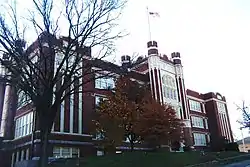Sanguinet & Staats was an architectural firm based in Fort Worth, Texas, with as many as five branch offices in Texas. The firm specialized in steel-frame construction and built many skyscrapers in Texas. The firm also accepted commissions for residential buildings, and designed many buildings listed on the National Register of Historic Places.[1]
History of the Partnerships
Sanguinet & Staats was an architecture firm formed in 1903 by Marshall R. Sanguinet, who had practiced in Fort Worth since 1883, and Carl G. Staats, a draftsman who had worked for James Riely Gordon.[2][3] The firm established its original office in Fort Worth and later expanded with offices in five Texas cities: Dallas, Houston, San Antonio, Waco, and Wichita Falls. Sanguinet & Staats also took on various partners over time.[2] In 1903, the Dallas office sprung from a new partnership called Sanguinet, Staats and Hill, which operated for two years under that name until Charles D. Hill left the firm.[4] In 1922, architect Wyatt C. Hedrick joined and it became Sanguinet, Staats, and Hedrick. In turn, this firm added R.D. Gottlieb as a limited partner for just the Houston office, forming Sanguinet, Staats, Hedrick, and Gottlieb. Sanguinet and Staats retired in 1926 after selling their shares to Hedrick.[2] From 1923 to 1934, Preston M. Geren Sr. worked for the firm as chief engineer before starting his own Fort Worth firm.[5]
Works
Although Sanguinet and Staats designed various kinds of buildings, the firm's main business was the design and construction of tall, street-framed office buildings.
Works (and credits) include:
- Agricultural Pavilion, 1925, with architects Wyatt C. Hedrick; Sanguinet, Staats, and Hedrick; William Ward Watkin.
- ALICO Building, built in 1910 by the architectural firm Sanguinet & Staats with associate architect Roy Lane, for the Amicable Life Insurance
- Neil P. Anderson Building, 411 W. 7th St. Fort Worth, Texas (Sanguinett & Staats) NRHP-listed[1]
- Stephen F. Austin Elementary School, 319 Lipscomb St., Fort Worth, Texas (Messer,Sanguinet & Messer) NRHP-listed[1]
- James L. Autry House, 5 Courtlandt Pl., Houston, Texas (Sanguinet & Staats) NRHP-listed[1]
- William J. Bryce House, 4900 Bryce Ave., Fort Worth, Texas (Sanguinet,Marshall) NRHP-listed[1]
- Burk Burnett Building, 500—502 Main St., Fort Worth, Texas (Sanguinet & Staats) NRHP-listed[1]
- Carter Building, 806 Main St., Houston, Texas (Sanguinet & Staats)
- A. S. Cleveland House, 8 Courtlandt Pl., Houston, Texas (Sanguinet & Staats) NRHP-listed[1]
- John M. Dorrance House, 9 Courtlandt Pl., Houston, Texas (Sanguinet,Staats & Barnes) NRHP-listed[1]
- Eighth Avenue Historic District, Bounded by 8th Ave., Pennsylvania Ave., 9th Ave., and Pruitt St., Fort Worth, Texas (Sanguinet & Staats) NRHP-listed[1]
- Flatiron Building, 1000 Houston St., Fort Worth, Texas (Sanguinet & Staats) NRHP-listed[1]
- Franklin Lofts, designed by architect Sanguinet and Staats
- Great Jones Building, with which Sanguinet & Staats is believed to be associated
- Hot Springs High School (Arkansas), Oak St. between Orange and Olive Sts., Hot Springs, AR Late Gothic Revival architecture (Sanguinet & Staats) NRHP-listed[1]
- Hotel Texas, 815 Main St., Fort Worth, Texas (Sanguinet & Staats) NRHP-listed[1]
- Knights of Pythias Building (Fort Worth, Texas), 315 Main St., Fort Worth, Texas restored 1981, designed by architect Sanguinet & Staats, 1901; renovated Thomas E. Woodward & Associates, 1988 NRHP-listed[1]
- Link-Lee House, 3800 Montrose, Houston, Texas (Sanguinet & Staats) NRHP-listed[1]
- C. L. Neuhaus House, 6 Courtlandt Pl., Houston, Texas (Sanguinet,Staats & Barnes) NRHP-listed[1]
- North Fort Worth High School (now J.P. Elder Annex), 600 Park St., Fort Worth, Texas (Sanguinet and Staats) NRHP-listed[1]
- Our Lady of Victory Academy, 801 W. Shaw St., Fort Worth, Texas (Sanguinet and Staats) NRHP-listed[1]
- Palestine High School (now the Museum for East Texas Culture), 400 Micheaux Ave., Palestine, Texas (Sanguinet & Staats) NRHP-listed[1]
- Paul Building, 1018 Preston Ave., Houston, Texas (Sanguinet & Staats) NRHP-listed[1]
- Sam Houston Hotel, 1117 Prairie St., Houston, Texas (Sanguinet, Staats, Hedrick & Gottlie) NRHP-listed[1]
- San Jacinto Building, designed by the firm Sanguinet, Staats, and Gottlieb.
- Marshall R. Sanguinet House, 4729 Collinwood Ave., Fort Worth, Texas (Sanguinet, Marshall R.) NRHP-listed[1]
- Scarbrough Building, 500 block, Congress Ave., Austin, Texas (Sanguinet & Staats)
- South Main Baptist Church, designed in 1924 by Sanguinet, Staats, Hedrick and Gottlieb
- St. Andrew's Episcopal Church, Texas, build 1909–1912, designed by Sanguinet & Staats[6]
- St. Mary of the Assumption Church, Texas, built 1923, designed by architect Sanguinet, Staats & Hedrick, architecture Romanesque, Romanesque Revival. NRHP-listed[1]
- Sterling Myer House, 4 Courtlandt Pl., Houston, Texas (Sanguinet & Staats) NRHP-listed[1]
- Texas Technological College Dairy Barn, Texas Tech University campus, Lubbock, Texas (Sanguinet, Staats & Hedrick) NRHP-listed[1]
- W. T. Waggoner Building, 810 Houston St., Fort Worth, TX (Sanguinet & Staats) NRHP-listed[1]
- Wharton-Scott House, 1509 Pennsylvania Ave., Fort Worth, TX (Sanguinet & Staats) NRHP-listed[1]
- Wilson Building, 1621-1623 Main St., Dallas, TX (Sanguinet & Staats) NRHP-listed[1]
References
- 1 2 3 4 5 6 7 8 9 10 11 12 13 14 15 16 17 18 19 20 21 22 23 24 25 26 27 "National Register Information System". National Register of Historic Places. National Park Service. March 13, 2009.
- 1 2 3 Christopher Long (15 June 2010). "Sanguinet and Staats". Texas State Historical Association. Retrieved 13 October 2017.
- ↑ Jay C. Henry (1993). Architecture in Texas, 1895-1945. Austin: University of Texas Press. p. 57.
- ↑ "Sanguinet, Staats, and Hedrick: An Inventory of their Drawings, Photographs, and Records, 1907-1969, 1991". Texas Archival Resources Online. Retrieved 13 October 2017.
- ↑ Cohen, Judith S. (January 1, 1995). "Geren, Preston Murdoch, Sr. (1891–1969)". Handbook of Texas. Texas State Historical Association. Retrieved 16 February 2023.
- ↑ Roberts, John. "St. Andrew's Anglican Church". Architecture in Fort Worth. Retrieved 19 December 2022.
